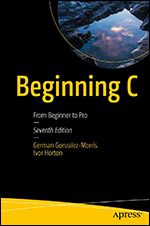Beginning C++
- 13h 14m
- Ivor Horton
- Apress
- 2014
Beginning C++ is a tutorial for beginners in C++ and discusses a subset of C++ that is suitable for beginners. The language syntax corresponds to the C++14 standard. This book is environment neutral and does not presume any specific operating system or program development system. There is no assumption of prior programming knowledge.
All language concepts that are explained in the book are illustrated with working program examples. Most chapters include exercises for you to test your knowledge. Code downloads are provided for examples from the text and solutions to the exercises and there is an additional download for a more substantial project for you to try when you have finished the book.
This book introduces the elements of the C++ standard library that provide essential support for the language syntax that is discussed. While the Standard Template Library (STL) is not discussed to a significant extent, a few elements from the STL that are important to the notion of modern C++ are introduced and applied.
Beginning C++ is based on and supersedes Ivor Horton’s previous book, Beginning ANSI C++.
What you’ll learn
- How to work with fundamental C++ data types and do calculations
- How to build logic into a program using loops, choices, decisions and more
- How to work with arrays, vectors, and strings
- How to use raw pointers and smart pointers
- How to program with functions and deal with program files and pre-processing directives
- How to define your own data types using classes and class operations
- How to implement operator overloading for your own data types
- How to apply class inheritance and use virtual functions to obtain polymorphism and errors/exception handling
- How to signal and handle errors using exceptions
- How to define and use function templates and class templates
- How to do file input and output with C++
About the Author
Ivor Horton is self-employed in consultancy and writes programming tutorials. He worked for IBM for many years and holds a bachelor's degree, with honors, in mathematics. Horton's experience at IBM includes programming in most languages (like assembler and high-level languages on a variety of machines), real-time programming, and designing and implementing real-time closed loop industrial control systems. He has extensive experience teaching programming to engineers and scientists (Fortran, PL/1, APL, etc.). Horton is an expert in mechanical, process, and electronic CAD systems; mechanical CAM systems; and DNC/CNC systems.
In this Book
-
Basic Ideas
-
Introducing Fundamental Types of Data
-
Working with Fundamental Data Types
-
Making Decisions
-
Arrays and Loops
-
Pointers and References
-
Working with Strings
-
Defining Functions
-
Lambda Expressions
-
Program Files and Preprocessing Directives
-
Defining Your Own Data Types
-
Operator Overloading
-
Inheritance
-
Polymorphism
-
Runtime Errors and Exceptions
-
Class Templates
-
File Input and Output







